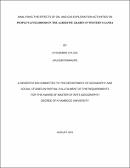| dc.description.abstract | This study was conducted to establish the effects of oil and gas exploration activities on people’s livelihoods in Butiaba Sub County, Buliisa District in the Eastern shores of Lake Albert, western Uganda. Across sectional survey design was adopted to realise the study objectives, using both quantitative and qualitative approaches. All the 4 parishes in Butiaba Sub County were included in the study, picking 5 villages from each. A sample of 310 respondents comprising of 297 household heads and 13 key informants were selected from the study area using simple random and purposive sampling strategies. Questionnaires were administered to household heads while interviews were held with the key informants comprising of oil and gas companies’ employees, District officials, and local leaders. Field data was collected through direct field observations and documentation. Questionnaire responses were organised and coded to generate quantitative data, which were analysed using Multiple Response Analysis (MRA) with the help of SPSS version 23.0 and the results reported as frequencies and percentages. Qualitative data obtained during key informant interviews underwent content analysis and the results were reported in form of narratives. The study found out that surveying was the most dominant oil and gas exploration activity followed by mapping, oil well drilling, site clearance, seismic probing, construction works and land acquisition which was the least dominant among all the activities. Commissioning of oil and gas exploration activities was found to have had both positive and negative effects on people’s livelihoods. Positively there was increased engagement in livelihood activities such as trade and commerce (by 10.3%), casual employment (by 26.2%) formal employment (by 84) and sand mining (by 8.2%). Further positive outcomes included increased access to food and infrastructural developments. Negatively, there was decreased engagement in livelihood activities such as crop farming (by -32.1%), livestock farming (by -26%) and fishing (by -45%). Other negative outcomes included increase in land conflicts and displacement of people thus affecting their production. To deal with the negative effects of oil and gas exploration activities, tree planting, resettlement & compensation and exploration sites restoration were the main mitigation measures undertaken by oil and gas companies, the community and NGOs in Butiaba Sub County. From the study, a conclusion is reached that commissioning of oil and gas exploration activities in the Albertine region has brought about a number of positive effects on people’s livelihood sources leading to job creation, market expansion, increase in land value and development of social amenities from the exploration support infrastructure. However, the activities have also affected people’s livelihood sources negatively. An integrated stakeholder involvement is suggested for managing the effects of oil and gas exploration activities in Buliisa and future research to focus on assessing effects of oil and gas exploration on land resources from which people derive their livelihoods, using remote sensing and GIS. | en_US |

